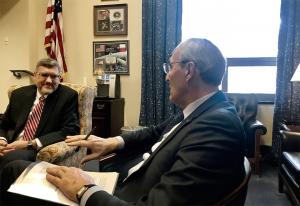A leap forward that benefits ITER
Last week's Newsline reported on the participation of the ITER Director-General in a US Congressional hearing on 6 March focused on the US fusion research program, including ITER. Rarely has such a visit seemed more timely. Eight days later, on Wednesday 14 March, the House of Representatives issued a revised draft of budget legislation that almost doubled US fiscal year 2018 (FY2018) funding for ITER—from the $63 million originally proposed to $122 million. A mere 48 hours later, the draft "omnibus spending bill" had been approved by House and Senate and signed into law by President Trump.


